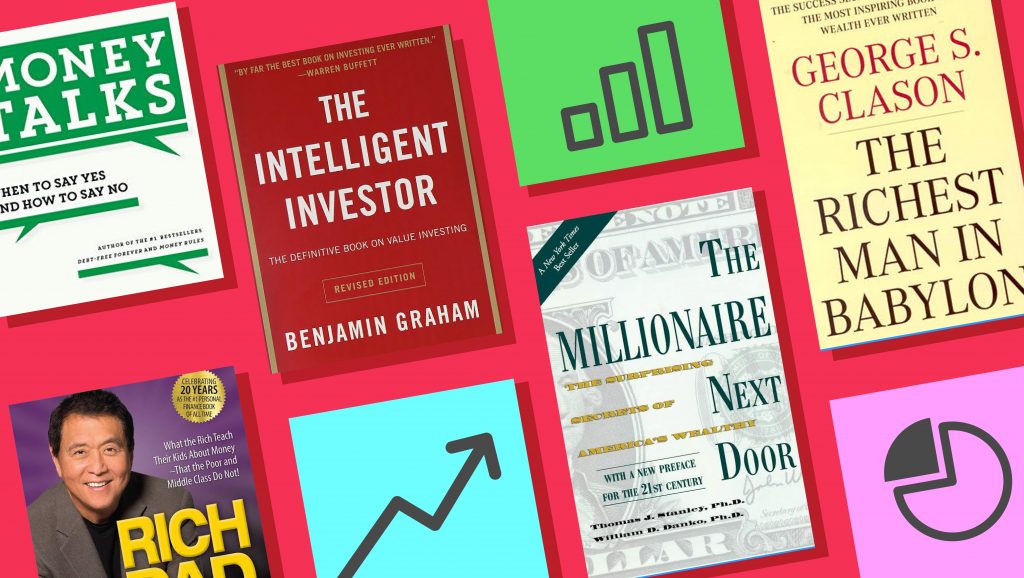Last Updated on Feb 25, 2021 by Aradhana Gotur
Personal finance books can be your best friends if you let them be. They are a treasure-trove of tried-and-tested best practices and can help you keep your finances sorted. From adopting healthy financial habits, managing your day-to-day monetary affairs and doing the dreadful money talk, these 5 personal finance books will help you live a secured financial life.
Table of Contents
1. Rich Dad, Poor Dad: What the Rich Teach Their Kids About Money That the Poor and Middle Class Do Not! by Robert Kiyosaki
That some people are filthy rich and others remain poor despite all their efforts has got a lot to do with their own minds. The mind, which is the source of actions, controls everything that happens in life. This means, the rich do something very different from the poor, which is what the author Robert Kiyosaki tells his readers in his book Rich Dad, Poor Dad. Mostly based on the stark differences between the approach that his biological poor dad and his best friend’s rich dad have towards finance, this book is a must-read if you are a beginner at managing finances and want to start off with a strong foundation.
Cutting to the core, Kiyosaki says that men are driven by two emotions: fear and greed that keep him from realising their potential to create wealth. Fear of risking and not fitting in with the world forces people to go to school and college, get a job, and secure their lives. Though this conventional way worked well in the past, it hardly fits in the present because formal education no longer guarantees job security. Further, greed makes people spend the hike in their income on living a higher standard of living, whereas, they should have been smarter and invested the difference in assets that generate cash flows.
Kiyosaki also touches an integral part of human beings — the mind — that directs the way you manage your finances. One particular excerpt that brings out this essence is asking ‘How can I afford something?’ instead of saying ‘I can’t afford it.’ Says the author, while the question pushes your mind to think of ways to make more money and afford something you can’t, the statement shuts your mind altogether, not allowing you to explore your potential to look for ways to afford that which you want.
Another pillar of personal finance that the book covers beautifully is the risk. Instead of avoiding risk, Robert asks the readers to manage it and says that it is the only way to earn returns and generate wealth. He substantiates the fact by pointing out that the rich are not afraid of taking on risks, and the result is that they accumulate wealth greater than the poor. Kiyosaki also reveals that understanding the difference between money and the source of money is paramount to accumulate wealth. While the poor concentrate on making money, which they get through a paycheck month on month, the rich, focus on finding a source of money that generates returns even when you are not around.
The rest of the book is peppered with personal finance rules and best moves that the rich follow. The author also speaks of the significance of being financially literate and understanding the basics of risk, assets, and liabilities. Two notable lessons here are:
- Genius is in knowing that everything is risky, you can never run away from it, but only manage it
- An asset is that which generates cash flow and a liability is anything that eats into your earnings
All in all, in his book Rich Dad, Poor Dad, Kiyosaki writes that you only achieve what your mind allows you to. If you want to finish rich then think, act, and live as the rich do, but first invest in your financial literacy. Doing this will help you make informed decisions and accumulate wealth.
2. The Richest Man In Babylon by George S. Clason
Written in 1926, The Richest Man In Babylon by George S. Clason is a must-read book to access a treasure trove of knowledge on personal finance that finds application even in today’s modern era. The book is a compilation of interesting parables based on life in the ancient city of Babylon, the richest city at the time. The classic narrates timeless lessons on aspects of personal finance like thrift, financial planning and awareness, wealth creation, maintenance and multiplication, which form the foundation of financial literacy and gives valuable insights on how to manage money.
George delves deeper and says that wealth creation results from saving before spending, embracing frugality, keeping expenses in check, providing for emergencies, investing savings in a diversified portfolio, and managing debt wisely. Besides core financial lessons, the author also throws light on the power of determination and how it paves the way to achieve what you wish. In addition, Clason also emphasises the role that the compounding power of money plays in accumulating wealth for retirement.
Another noteworthy lesson that you can learn from this classic is the importance of investing in yourself, which increases your knowledge, value and employability, and thus enhances your earning ability. The lesson here is simple, the more you offer, the more wealth you seek. To round up, The Richest Man In Babylon not only teaches how to earn, but also offers lessons on how to grow your money and manage it smartly.
3. The Intelligent Investor by Benjamin Graham
Written in 1949 by Benjamin Graham, the mentor of Warren Buffett, The Intelligent Investor is considered as the stock market bible that is a must-read if you are looking to learn the basics of investing. In this book, Graham speaks extensively on value investing, a method that advocates investing in underpriced stocks, ditching the herd and instead basing your investment decisions upon a sound financial analysis, and staying invested for a long-term.
Throughout the book, Graham has penned nuggets of value investing, starting with the difference between a speculator and an investor. Knowing who you are is the foundation to formulating an investment strategy that works best for you and the reason is simple. Speculators mostly rely on market timing and investors on fundamental analysis. He then highlights 6 principles of investing, which are summarised in the following stanza.
To realise gains, speculators time the market, but investors, on the other hand, should do fundamental analysis, formulate a long-term investment plan, pick fairly-priced stocks, maintain a margin of safety, and follow the strategy irrespective of the market fluctuations.
In elaborate words, as an investor, it is important to invest in businesses you believe in and whose stocks will grow in value and not just price overtime. This means that instead of considering a hike in the stock price as a gain, which may or may not happen in the future, it is wise to consider the dividends and profits as earnings. He also advises the readers to maintain a margin-of-safety to mitigate risk and preserve the capital and not run behind a rise in share prices. Lastly, he asks the investors to steer clear from following the market sentiment and instead have faith in their fundamental stock analysis and stick to their strategy for a long-term.
4. Money Talk by Gail Vaz-Oxlade
Personal finance is not only about earning money and accumulating wealth, but also talking about money with your loved ones. That is to say, keeping them in the loop when it comes to financial matters. More often than not, money and relationships don’t go well together as it gives birth to complications.
For instance, you were entitled to ask your parents for money when in school, but seeking financial aid as a grown-up to pay your debts is rather undesirable. Similarly, seeking monetary help from children is not a simple task for retired parents and asking your close bud to repay the money you lent is something you would last want.
Other instances when “money” creates a tiff between people include asking your spouse to limit spending, asking your children to take care of their expenses and save. Such instances knock down the best of us, because the toughest money problem, as the author says, is the people you love.
At such times many questions like how to approach people, how to initiate the talk, what questions to ask, and how to refuse knock down the best of us. Thankfully, Gail Vaz-Oxlade, the author of Money Talks, seems to have answers to all your questions related to money talks.
In her book, Gail has penned over 75 scenarios based on Canadians. Each of these anecdotes narrate how human traits like selfishness, fearfulness, tyranny, and laziness dominate a person during money talks and impact a relationship. To summarize, Gail points out that human behaviour and not money create tiffs. Through her book, Gail encourages you to compare your story with the ones in the book, reflect and draw inspiration to talk money with loved ones effectively. Read Money Talks to find answers to the most difficult questions relating to money talks and negotiate with your loved ones to get your desired outcome.
5. The Millionaire Next Door by Thomas J Stanley and William D Danko
Some of the most flawed perceptions about millionaires are that they inherit riches from ancestors and accumulate so much wealth that allows them to spend lavishly without thinking twice. Nevertheless, most millionaires are self-made men and women who manage their finances outstandingly well. The Millionaire Next Door by Thomas J Stanley and William D Danko is an excellent book that shatters various myths relating to millionaires.
Based on the extensive research conducted by the authors, this book doesn’t teach you how to be a millionaire, instead, it gives you a tour of how America’s millionaires think and live. The authors have penned this book after interviewing more than 500 millionaires and conducting over 1,000 surveys. The studies, listed below, are surprising and contrast what an average middle-class person perceives about a millionaire:
- Millionaires live a modest lifestyle and put financial independence above social status
- They are thrifty people who operate their household based on an annual budget
- They save generously, invest it and capitalise on market opportunities
- They are mostly self-employed (20% are employees) and do what they love and use time, energy, and finances efficaciously
- Neither did they receive financial aid from their parents nor do they give any to their adult children
Read The Millionaire Next Door if you want to live in a millionaire’s mind, understand their secrets of living and money, and implement them in your life to be one of them.
- Best Performing Index Funds in India (2025) - Jun 5, 2025
- Issue of Shares – Meaning, Types, Examples and Steps - Jun 4, 2025
- Banking Mergers in India – List of Merged PSU Banks, Advantages, and Challenges - Jun 3, 2025





